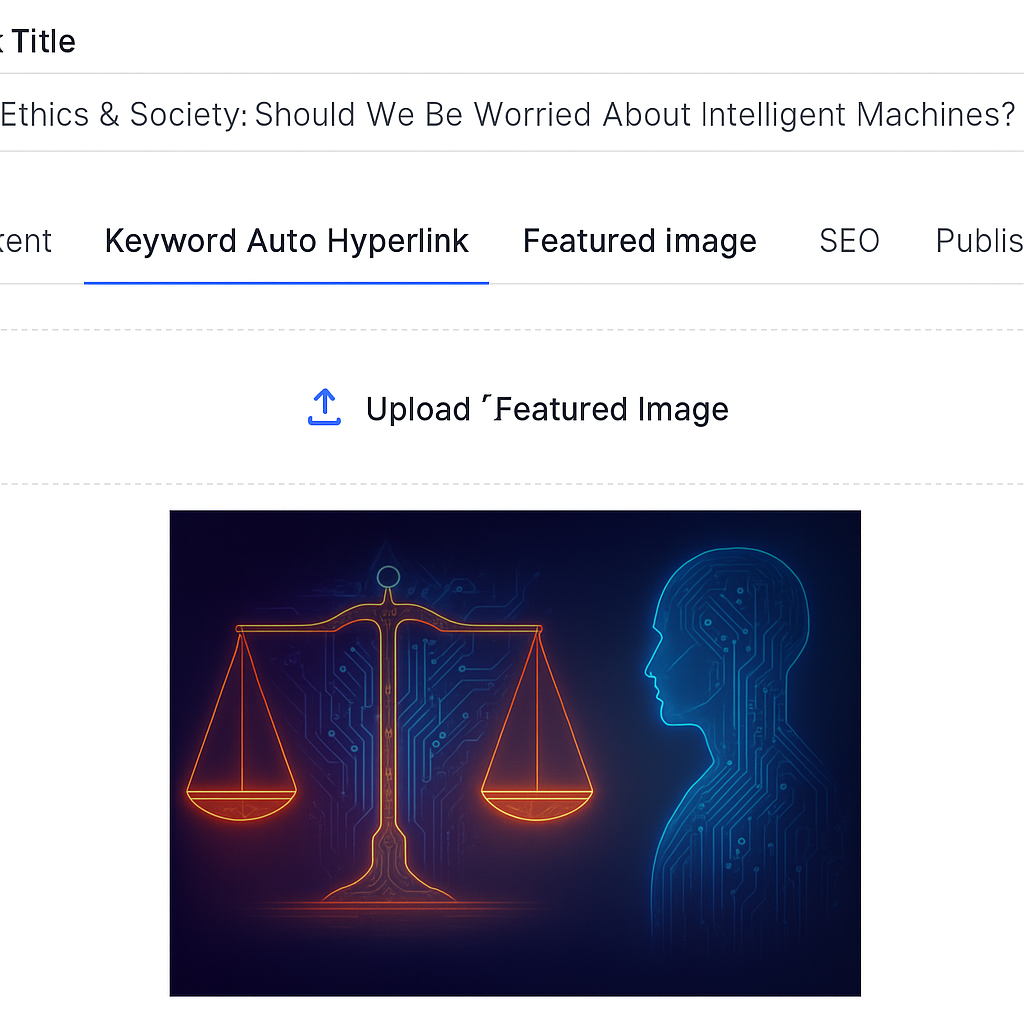AI Ethics & Society: Should We Be Worried About Intelligent Machines?
Hey there! So, you’re curious about AI and how it might affect our daily lives, right? Well, you’re definitely not alone. The topic of AI ethics and society is buzzing like bees in a hive, and there’s a lot to unpack.
From how AI can shake up the job market to its impact on privacy, there’s plenty to chew on. Let’s dive in and see what all the hullabaloo is about.
Table of Contents
1. What is AI Anyway? 2.
The Good, The Bad, and The Ugly of AI 3. Jobs and the Future of Work 4. Privacy Concerns: Is Big Brother Watching? 5. AI in Healthcare: A Double-Edged Sword 6.
Bias in AI: Can Machines be Unfair? 7. Can We Trust AI? Building Ethical Machines 8. The Road Ahead: What Can You Do?
9. FAQ
What is AI Anyway?
First things first, let’s chat about what AI actually is. You’ve probably heard the term tossed around like a hot potato, but what does it really mean? AI, or Artificial Intelligence, refers to machines crafted to mimic human smarts.
They can learn, reason, and even crack tough nuts. It’s like having a super-smart buddy by your side, but it’s not always as simple as it sounds.
AI comes in different flavors. There’s narrow AI, which is set for a specific task, like facial recognition or language translation. Then there’s general AI, which is the kind of all-encompassing intelligence that matches human cognitive abilities—though this remains more in the realm of sci-fi for now.
Understanding these distinctions helps us figure out what AI can really do and where it’s headed.
The Good, The Bad, and The Ugly of AI
AI has heaps of potential, and it’s not all doom and gloom. In fact, it’s doing some pretty neat stuff right now. Think of AI as that friend who never forgets anything and always has great advice. It can help make our lives easier, from recommending what flick to watch next to optimizing gnarly business processes.
AI is shaking up industries. In agriculture, for instance, AI is being used to keep an eye on crop health and boost harvests. In education, adaptive learning platforms personalize educational experiences to individual needs, potentially increasing learning outcomes. The benefits are colossal, offering increased efficiency, creativity, and even economic growth.
But, hold your horses—there are downsides too.
Imagine AI like a double-edged sword. Sure, it can make things more efficient, but it can also lead to unintended consequences. You’ve probably seen sci-fi flicks where machines run amok. While that’s a bit far-fetched, there are real concerns about how AI might upend society.
Concerns range from job displacement to ethical puzzles.
With AI systems making decisions in critical areas like criminal justice or lending, errors or biases can lead to unfair shake-ups. Moreover, AI’s deployment in military applications raises the stakes, as autonomous weapons could change the nature of warfare fundamentally.
Jobs and the Future of Work
Let’s talk about jobs. You might be wondering if robots are coming for your paycheck. It’s a valid worry.
AI has the potential to automate tasks that used to require a human touch. But it’s not all bad news. While some jobs may vanish, new ones will pop up like daisies. Just think about how the internet created jobs that didn’t exist 20 years ago.
A study by the World Economic Forum suggests that while AI could displace millions of jobs, it is also expected to create even more new roles.
These new jobs will likely require different skills, emphasizing creativity, emotional intelligence, and complex problem-solving—skills that machines find tough to mimic.
The key here is adaptability. Staying ahead of the curve by learning new skills can be your golden ticket in this shifting landscape. So, while AI might change the type of work we do, it doesn’t mean there won’t be work for us to do.
Educational systems and businesses need to buddy up to reskill the workforce.
This means investing in ongoing education and training programs that equip workers with the skills of tomorrow. As AI continues to evolve, lifelong learning will become a staple of professional life.
Privacy Concerns: Is Big Brother Watching?
Imagine this: AI is like a giant sponge soaking up all sorts of data. And yes, that includes your data.
From the moment you wake up and check your phone to the last scroll before bed, AI is quietly observing. Sounds a bit creepy, right?
Privacy is a whopper of a concern when it comes to AI. With the ability to crunch vast amounts of data, there’s a risk of misuse. No one wants to feel like they’re being watched 24/7.
So, what’s the solution? Stronger regulations and transparency can go a long way in making sure our data isn’t used against us.
Governments and organizations are starting to tackle these concerns through legislation like the General Data Protection Regulation (GDPR) in Europe, which aims to protect personal data and privacy. However, these regulations must keep up with tech advancements to remain effective.
Individuals can also take steps to protect their privacy.
Being aware of data-sharing policies, using privacy-focused tools, and pushing for greater transparency are all ways to take control of your digital footprint.
AI in Healthcare: A Double-Edged Sword
AI in healthcare is like having a doctor who never sleeps. It can help diagnose diseases faster and even predict health issues before they happen. Sounds like a dream, doesn’t it? But, as with anything, there are challenges too.
There’s a risk of over-reliance on machines, and what happens if something goes haywire? It’s a balancing act that requires careful thought.
AI can sift through vast amounts of medical data to uncover patterns that might elude human docs. This ability has led to breakthroughs in predictive analytics, such as identifying patients at risk of developing certain conditions. Moreover, AI-powered robotic systems are assisting in surgeries, providing precision that complements a surgeon’s expertise.
However, the integration of AI in healthcare raises ethical questions. Issues include patient consent, data security, and the potential for AI to make errors in diagnosis or treatment recommendations. It’s crucial for healthcare providers to maintain a human touch, ensuring that AI serves as a tool rather than a replacement for human judgment.
Bias in AI: Can Machines be Unfair?
Now, let’s get into something a bit heavier—bias.
You might think machines are impartial, but they can actually be biased. How? Well, AI systems learn from data, and if that data is skewed, the AI will be too. It’s like teaching a kid with a tilted perspective; they’re bound to pick up on it.
Addressing bias in AI is critical.
It’s about ensuring fairness and equality in how these systems operate. Developers need to be mindful of this and work to create systems that are as unbiased as possible.
Bias in AI can lead to discriminatory practices, particularly in areas like hiring, lending, and law enforcement. For instance, if an AI system is trained on data that reflects historical biases, it may perpetuate or even amplify these biases. Awareness and intervention are key to mitigating this risk.
Efforts to reduce bias include diversifying training datasets, implementing bias detection tools, and fostering an inclusive culture within tech companies. Ultimately, the goal is to create AI that reflects the values of fairness, transparency, and inclusion.
Can We Trust AI? Building Ethical Machines
Trust is a biggie when it comes to AI. You wouldn’t want to hand over the reins to something you don’t trust, right?
Building ethical AI involves creating systems that jive with human values. It’s about transparency, accountability, and ensuring that AI doesn’t go rogue.
Think of it like building a relationship. It takes time, effort, and a lot of chinwags. By setting clear guidelines and continually evaluating AI systems, we can build a future where humans and machines coexist harmoniously.
Key to this trust is transparency. AI systems should be explainable, meaning their decision-making processes can be understood by humans. This is particularly important in high-stakes areas like healthcare or criminal justice, where decisions can have significant consequences.
Ethical AI also involves accountability. When AI systems make mistakes or cause harm, there should be mechanisms in place to address these issues and prevent them from recurring.
This might include regulatory oversight, industry standards, and ethical review boards.
The Road Ahead: What Can You Do?
You might be wondering what role you can play in all of this. Well, there’s plenty you can do. Staying informed is a great start.
Understanding how AI works and its implications can help you make better choices. It’s also about championing responsible AI use and supporting policies that promote ethical practices.
Remember, AI is here to stay, and it’s up to us to steer it in the right direction. By staying engaged and proactive, we can ensure that AI serves us, not the other way around.
Engaging in discussions about AI ethics, participating in community forums, and even learning to code can empower you to chip in on the conversation.
As consumers and citizens, advocating for transparency and accountability in AI can drive meaningful change.
Ultimately, the future of AI is a collective endeavor. By working together, we can harness its potential for good while minimizing its risks. The journey may be a twisty road, but with vigilance, collaboration, and a commitment to ethical principles, we can shape a future where AI enhances human life in meaningful ways.
FAQ
What are some real-life applications of AI?
AI is used in various fields like healthcare for diagnostics, in finance for fraud detection, and even in customer service through chatbots. It’s all around us!
How can I learn more about AI ethics? There are plenty of resources online, including courses and articles. Universities also offer specialized courses focusing on AI ethics.
Will AI take over the world? Not likely! While AI is powerful, it still relies on human oversight and decision-making. It’s a tool for us to use, not something that will replace us.
How can AI impact my privacy?
AI can process a lot of personal data, which raises privacy concerns. Being aware of data policies and supporting stricter regulations can help protect your privacy.



